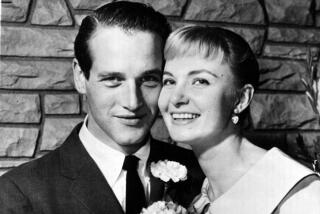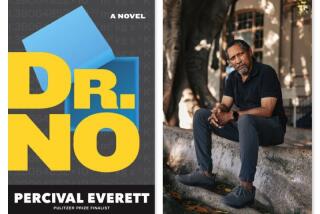Mary Daly dies at 81; radical feminist academician
Mary Daly, a radical feminist philosopher whose piercing critiques of patriarchal culture made her a guiding spirit of the women’s movement and a fractious presence at Boston College, where her refusal to admit men to her classes ended a three-decade teaching career, has died. She was 81.
Daly, whose health had deteriorated over the last two years because of a neurological disorder, died Jan. 3 at a nursing facility in Gardner, Mass., said Emily Erwin Culpepper, a longtime friend and University of Redlands professor of religion and women’s studies.
Brilliant, bawdy and cantankerous, Daly was a theologian who came to prominence with the publication of her first book, “The Church and the Second Sex” (1968), a withering critique of the treatment of women in Roman Catholicism that prompted an unsuccessful effort by the Jesuit-run Boston College to fire her. Denied raises and a full professorship, Daly boycotted faculty meetings, dismissing administrators and colleagues as “bore-ocrats” who suffered from “academentia.”
She evolved from a radical Catholic, hopeful of church reform, to a “post-Christian” lesbian feminist who believed that a radical feminist trying to change the church was “like a black person trying to reform the Ku Klux Klan.”
She wrote provocative books -- including “Beyond God the Father: Toward a Philosophy of Women’s Liberation” (1973), “Gyn/Ecology: The Metaethics of Radical Feminism” (1978) and “Pure Lust: Elemental Feminist Philosophy” (1984) -- that secured her rank as a major figure in the development of 20th century feminist thought. Known for her wordplay, she also wrote a feminist dictionary, “Websters’ First New Intergalactic Wickedary of the English Language” (with Jane Caputi, 1987).
“She was the first feminist philosopher, really,” said activist and writer Robin Morgan, who included Daly in her pioneering anthology “Sisterhood Is Powerful” (1970). “She opened the door for women to question everything.”
Daly exulted in what she called the “courage to sin.”
“The word ‘sin’ is derived from the Indo-European root ‘es-,’ meaning ‘to be.’ When I discovered this etymology,” she wrote in a 1996 New Yorker article, “I intuitively understood that for a woman trapped in patriarchy, which is the religion of the entire planet, ‘to be’ in the fullest sense is ‘to sin.’ ”
Born in Schenectady, N.Y., on Oct. 19, 1928, Daly was the only child of working-class Irish immigrants who encouraged her education. She was aware from an early age of the inequality of the sexes, recalling in the New Yorker story how she burned with “unquenchable” rage at the male classmate who gloated over the fact that he was an altar boy and that she, as a girl, could never “serve Mass.”
She earned a bachelor’s degree from the College of Saint Rose in Albany, N.Y., in 1950 before completing a master’s in English at Catholic University of America in Washington, D.C., in 1952. She wanted to teach theology, but Catholic women were not allowed to teach or study theology, so she obtained a doctorate in religion from Saint Mary’s College in Notre Dame, Ind., in 1952.
When the University of Notre Dame refused to admit her to its doctoral program in philosophy -- “solely on the basis of my sex,” she said -- she went to the University of Fribourg in Switzerland, which could not exclude women because it was government-supported. She stayed for seven years and earned doctorates in philosophy and theology.
In 1966, she became the first woman to teach theology at Boston College. But two years later, after she gained prominence as an audacious church critic with the publication of “The Church and the Second Sex,” the college gave her a one-year contract, in essence firing her. The decision did not play well in an era of student empowerment: 1,500 people -- mostly male students because the college was not yet coeducational -- marched in support of Daly.
In 1969, the college renewed Daly’s contract, promoted her to associate professor and gave her tenure.
In 1971 the theologian whose radical assertions included viewing the Trinity as patriarchy’s rip-off of triple goddesses in ancient culture, became the first woman to preach the Sunday sermon at Harvard’s 300-year-old Memorial Church. She called on the congregation to demonstrate its rejection of patriarchal religion by walking out of the church.
“We thought there would be just a few of us, but probably 90% got up to leave -- women and men,” recalled Culpepper, then a Harvard graduate student who helped Daly plan the event.
After Boston College began admitting women in 1970, Daly began to bar men from her feminist-centric courses, believing that their presence would stifle discussion. She agreed to teach men in private tutorials, but her refusal to allow them in her classes brought eight reprimands from college officials over the ensuing years. In one case, college officials escorted a man to her class for several weeks until he dropped out.
Whenever the issue heated up, Daly took a leave of absence until tempers cooled. The “power of absence,” as she called the tactic, stopped working in 1998, when her women-only policy was challenged by a student named Duane Naquin, who wanted to take Daly’s class in feminist ethics. Backed by the conservative Center for Independent Research, Naquin threatened a lawsuit, which gave the administration cause to push its gnarly feminist professor to retire.
Ironically, the college argued that Daly’s exclusion of men was a violation of Title IX, the 1972 law ensuring equal opportunities for women in educational settings. Critics suggested that Daly was a hypocrite for denying men access to her classes; commentator Gary Wills called her a “fake feminist.”
Daly, whose courses were stripped from the college catalog in 1999, sued the college for breach of contract and violation of tenure rights. The legal showdown ended in 2001 with a private settlement and an announcement that Daly had retired.
“There are and will be those who think I have gone overboard,” the self-described “positively revolting hag” said after a clash with college authorities. “Let them rest assured that this assessment is correct, probably beyond their wildest imagination, and that I will continue to do so.”
More to Read
Sign up for our Book Club newsletter
Get the latest news, events and more from the Los Angeles Times Book Club, and help us get L.A. reading and talking.
You may occasionally receive promotional content from the Los Angeles Times.







